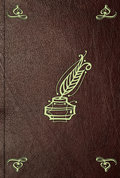
Вашингтон Ирвинг
The Student's Life of Washington; Condensed from the Larger Work of Washington Irving
CHAPTER XXXIV.
RETREAT THROUGH WESTCHESTER COUNTY. – BATTLE OF WHITE PLAINS
On the morning of the 12th of October, Washington received intelligence by express from General Heath, stationed above King's Bridge, that the enemy were landing with artillery on Throg's Neck in the Sound, about nine miles from the camp. Washington surmised that Howe was pursuing his original plan of getting into the rear of the American army, cutting off its supplies, which were chiefly derived from the East, and interrupting its communication with the main country. Officers were ordered to their alarm posts, and the troops to be ready, under arms, to act as occasion might require. Word, at the same time, was sent to General Heath to dispose of the troops on his side of King's Bridge, and of two militia regiments posted on the banks of Harlem River opposite the camp, in such manner as he should think necessary. Having made all his arrangements as promptly as possible, Washington mounted his horse, and rode over towards Throg's Neck to reconnoitre.
Throg's Neck is a peninsula in Westchester County, stretching upwards of two miles into the Sound. It was separated from the mainland by a narrow creek and a marsh, and was surrounded by water every high tide. A bridge across a creek connecting with a ruined causeway across the marsh, led to the mainland, and the upper end of the creek was fordable at low water. Early in the morning, eighty or ninety boats full of men had stood up the Sound from Montresor's Island, and Long Island, and had landed troops to the number of four thousand on Throg's Point, the extremity of the neck. Thence their advance pushed forward toward the causeway and bridge, to secure that pass to the mainland. General Heath had been too rapid for them. Colonel Hand and his Philadelphia riflemen had taken up the planks of the bridge, and posted themselves opposite the end of the causeway, whence they commenced firing with their rifles. They were soon reinforced by Colonel Prescott, of Bunker's Hill renown, with his regiment, and Lieutenant Bryant of the artillery, with a three-pounder. Checked at this pass, the British moved toward the head of the creek; here they found the Americans in possession of the ford, where they were reinforced by Colonel Graham of the New York line, with his regiment, and Lieutenant Jackson of the artillery, with a six-pounder. These skilful dispositions of his troops by General Heath had brought the enemy to a stand.
Having surveyed the ground, Washington ordered works to be thrown up at the passes from the neck to the mainland. The British also threw up a work at the end of the causeway. In the afternoon nine ships, with a great number of schooners, sloops, and flat-bottomed boats full of men, passed through Hell Gate, towards Throg's Point; and information received from two deserters, gave Washington reason to believe that the greater part of the enemy's forces were gathering in that quarter. General McDougall's brigade, in which were Colonel Smallwood and the independent companies, was sent in the evening to strengthen Heath's division at King's Bridge, and to throw up works opposite the ford of Harlem River. Greene, who had heard of the landing of the enemy at Throg's Neck, wrote over to Washington, from Fort Constitution, informing him that he had three brigades ready to join him if required.
[On the 14th, General Lee, whose return from the south had been anxiously expected, arrived in camp. The success of Lee at the south was contrasted by many with the defeat on Long Island and evacuation of New York, and they began to consider him the main hope of the army. His appearance was welcomed as the harbinger of good luck.] No one gave him a sincerer greeting than the commander-in-chief; who, diffident of his own military knowledge, had a high opinion of that of Lee. He immediately gave him command of the troops above King's Bridge, now the greatest part of the army, but desired that he would not exercise it for a day or two, until he had time to acquaint himself with the localities and arrangements of the post. Heath, in the interim, held the command.
In the meantime, Congress, on the 11th of October, having heard of the ingress of the Phoenix, Roebuck and Tartar, passed a resolution that General Washington be desired, if it be practicable, by every art, and at whatever expensive, to obstruct effectually the navigation of the North River between Fort Washington and Mount Constitution, as well to prevent the regress of the enemy's vessels lately gone up as to hinder them from receiving succors.
Washington held a council of war on the 16th, at Lee's head-quarters, at which all the major-generals were present excepting Greene, and all the brigadiers, as well as Colonel Knox, who commanded the artillery. Letters from the Convention and from individual members of it were read, concerning the turbulence of the disaffected in the upper parts of the State; intelligence gained from deserters was likewise stated, showing the intention of the enemy to surround the camp. The policy was then discussed of remaining in their present position on Manhattan Island, and awaiting there the menaced attack.
"After much consideration and debate," says the record of the council, "the following question was stated: Whether (it having appeared that the obstructions in the North River have proved insufficient, and that the enemy's whole force is now in our rear on Frog Point) it is now deemed possible, in our situation, to prevent the enemy from cutting off the communication with the country, and compelling us to fight them at all disadvantages or surrender prisoners at discretion?" All agreed, with but one dissenting voice,9 that it was not possible to prevent the communication from being cut off, and that one of the consequences mentioned in the question must follow.
As the resolve of Congress seemed imperative with regard to Fort Washington, that post, it was agreed, should be "retained as long as possible." A strong garrison was accordingly placed in it, composed chiefly of troops from Magaw's and Shee's Pennsylvania regiments, the latter under Lieutenant-colonel Lambert Cadwalader, of Philadelphia. Shee having obtained leave of absence, Colonel Magaw was put in command of the post, and solemnly charged by Washington to defend it to the last extremity. The name of the opposite post on the Jersey shore, where Greene was stationed, was changed from Fort Constitution to Fort Lee, in honor of the general. Lee, in fact, was the military idol of the day.
Previous to decamping from Manhattan Island, Washington formed four divisions of the army, which were respectively assigned to Generals Lee, Heath, Sullivan (recently obtained in exchange for General Prescott), and Lincoln. Lee was stationed on Valentine's Hill, on the mainland immediately opposite King's Bridge, to cover the transportation across it of the military stores and heavy baggage. The other divisions were to form a chain of fortified posts, extending about thirteen miles along a ridge of hills on the west side of the Bronx, from Lee's camp up to the village of White Plains.
Washington's head-quarters continued to be on Harlem Heights for several days. By his skilful disposition of the army it was protected in its whole length by the Bronx, a narrow but deep stream, fringed with trees, which ran along the foot of the ridge; at the same time his troops faced and outflanked the enemy, and covered the roads along which the stores and baggage had to be transported. On the 21st, he shifted his head-quarters to Valentine's Hill, and on the 23d to White Plains, where he stationed himself in a fortified camp.
While he was thus incessantly in action, General, now Sir William Howe, remained for six days passive in his camp on Throg's Point, awaiting the arrival of supplies and reinforcements, instead of pushing across to the Hudson, and throwing himself between Washington's army and the upper country. His inaction lost him a golden opportunity. By the time his supplies arrived, the Americans had broken up the causeway leading to the mainland, and taken positions too strong to be easily forced. Finding himself headed in this direction, Sir William re-embarked part of his troops in flat boats on the 18th, crossed Eastchester Bay, and landed on Pell's Point, at the mouth of Hutchinson's River. Here he was joined in a few hours by the main body, with the baggage and artillery, and proceeded through the manor of Pelham towards New Rochelle; still with a view to get above Washington's army.
In their march, the British were waylaid and harassed by Colonel Glover of Massachusetts, with his own, Reed's and Shepard's regiments of infantry. Twice the British advance guard were thrown into confusion and driven back with severe loss, by a sharp fire from behind stone fences. A third time they advanced in solid columns. The Americans gave them repeated volleys, and then retreated with the loss of eight killed and thirteen wounded, among whom was Colonel Shepard.
On the 21st, General Howe was encamped about two miles north of New Rochelle, with his outposts extending to Mamaroneck on the Sound. While in this neighborhood, he was reinforced by a second division of Hessians under General Knyphausen, and a regiment of Waldeckers, both of which had recently arrived in New York. He was joined, also, by the whole of the seventeenth light-dragoons, and a part of the sixteenth, which had arrived on the 3d instant from Ireland, with Lieutenant-colonel (afterwards Earl) Harcourt. Some of their horses had been brought with them across the sea, others had been procured since their arrival.
The Americans at first regarded these troopers with great dread. Washington, therefore, took pains to convince them, that in a rough, broken country, like the present, full of stone fences, no troops were so inefficient as cavalry. They could be waylaid and picked off by sharp-shooters from behind walls and thickets, while they could not leave the road to pursue their covert foe. Further to inspirit them against this new enemy, he proclaimed, in general orders, a reward of one hundred dollars for every trooper brought in with his horse and accoutrements, and so on, in proportion to the completeness of the capture.
On the 25th, about two o'clock in the afternoon, intelligence was brought to head-quarters that three or four detachments of the enemy were on the march, within four miles of the camp, and the main army following in columns. The drums beat to arms; the men were ordered to their posts; an attack was expected. The day passed away, however, without any demonstration of the enemy. Howe detached none of his force on lateral expeditions, evidently meditating a general engagement. To prepare for it, Washington drew all his troops from the posts along the Bronx into the fortified camp at White Plains. Here everything remained quiet but expectant, throughout the 26th. In the morning of the 27th, which was Sunday, the heavy booming of cannon was heard from a distance seemingly in the direction of Fort Washington. Scouts galloped off to gain intelligence. We will anticipate their report.
Two of the British frigates, at seven o'clock in the morning, had moved up the Hudson, and come to anchor near Bourdett's Ferry, below the Morris House, Washington's old head-quarters, apparently with the intention of stopping the ferry, and cutting off the communication between Fort Lee and Fort Washington. At the same time, troops made their appearance on Harlem Plains, where Lord Percy held command. Colonel Morgan immediately manned the lines with troops from the garrison of Fort Washington. The ships opened a fire to enfilade and dislodge them. A barbette battery on the cliffs of the Jersey shore, left of the ferry, fired down upon the frigate, but with little effect. Colonel Magaw got down an eighteen-pounder to the lines near the Morris House, and fired fifty or sixty rounds, two balls at a time. Two eighteen-pounders were likewise brought down from Fort Lee, and planted opposite the ships. By the fire from both shores they were hulled repeatedly.
It was the thundering of these cannonades which had reached Washington's camp at White Plains. The ships soon hoisted all sail. The foremost slipped her cable, and appeared to be in the greatest confusion. She could make no way, though towed by two boats. The other ship seeing her distress sent two barges to her assistance, and by the four boats she was dragged out of reach of the American fire, her pumps going all the time. At the time that the fire from the ships began, Lord Percy brought up his field-pieces and mortars, and made an attack upon the lines. He was resolutely answered by the troops sent down from Fort Washington, and several Hessians were killed. An occasional firing was kept up until evening, when the ships fell down the river, and the troops which had advanced on Harlem Plains drew within their lines again.
While these things were passing at Fort Washington, Lee had struck his tents, and with the rear division, eight thousand strong, the baggage and artillery, and a train of wagons four miles long, laden with stores and ammunition, was lumbering along the rough country roads to join the main army. It was not until Monday morning, after being on the road all night, that he arrived at White Plains.
Washington's camp was situated on high ground, facing the east. The right wing stretched towards the south along a rocky hill, at the foot of which the Bronx, making an elbow, protected it in flank and rear. The left wing rested on a small, deep lake among the hills. The camp was strongly intrenched in front. About a quarter of a mile to the right of the camp, and separated from the height on which it stood by the Bronx and a marshy interval, was a corresponding height called Chatterton's Hill. As this partly commanded the right flank, and as the intervening bend of the Bronx was easily passable, Washington had stationed on its summit a militia regiment.
The whole encampment was a temporary one, to be changed as soon as the military stores collected there could be removed; and now that General Lee was arrived, Washington rode out with him, and other general officers who were off duty, to reconnoitre a height which appeared more eligible. When arrived at it, Lee pointed to another on the north, still more commanding. "Yonder," said he "is the ground we ought to occupy." "Let us go, then, and view it," replied Washington. They were gently riding in that direction, when a trooper came spurring up his panting horse. "The British are in the camp, sir!" cried he. "Then, gentlemen," said Washington, "we have other business to attend to than reconnoitring." Putting spurs to his horse, he set off for the camp at full gallop, the others spurring after him.
Arrived at head-quarters, he was informed by Adjutant-general Reed, that the picket guards had all been driven in, and the enemy were advancing; but that the whole American army was posted in order of battle. Apprehensive that the enemy might attempt to get possession of Chatterton's Hill, he detached Colonel Haslet with his Delaware regiment, to reinforce the militia posted there. To these he soon added General McDougall's brigade, composed of Smallwood's Marylanders, Ritzema's New Yorkers, and two other regiments. General McDougall had command of the whole force upon the hill, which did not exceed 1,600 men.
These dispositions were scarcely made, when the enemy appeared glistening on the high grounds beyond the village of White Plains. They advanced in two columns, the right commanded by Sir Henry Clinton, the left by the Hessian general, De Heister. There was also a troop of horse; so formidable in the inexperienced eyes of the Americans. For a time they halted in a wheat field, behind a rising ground, and the general officers rode up in the centre to hold a consultation. Washington supposed they were preparing to attack him in front, and such indeed was their intention; but the commanding height of Chatterton's Hill had caught Sir William's eye, and he determined first to get possession of it. Colonel Rahl was accordingly detached with a brigade of Hessians to make a circuit southwardly round a piece of wood, cross the Bronx about a quarter of a mile below, and ascend the south side of the hill; while General Leslie, with a large force, British and Hessian, should advance directly in front, throw a bridge across the stream, and charge up the hill.
A furious cannonade was now opened by the British from fifteen or twenty pieces of artillery, placed on high ground opposite the hill; under cover of which, the troops of General Leslie hastened to construct the bridge. In so doing, they were severely galled by two field-pieces, planted on a ledge of rock on Chatterton's Hill, and in charge of Alexander Hamilton. Smallwood's Maryland battalion also kept up a sharp fire of small arms. As soon as the bridge was finished, the British and Hessians under Leslie rushed over it, formed, and charged up the hill to take Hamilton's two field-pieces. Three times the two field-pieces were discharged, ploughing the ascending columns from hill-top to river, while Smallwood's "blue and buff" Marylanders kept up their volleys of musketry.
In the meantime, Rahl and his Hessian brigade forded the Bronx lower down, pushed up the south side of the hill, and endeavored to turn McDougall's right flank. The militia gave the general but little support. They had been dismayed at the opening of the engagement by a shot from a British cannon, which wounded one of them in the thigh, and nearly put the whole to flight. It was with the utmost difficulty McDougall had rallied them and posted them behind a stone wall. Here they did some service, until a troop of British cavalry, having gained the crest of the hill, came on, brandishing their sabres. At their first charge the militia gave a random, scattering fire, then broke, and fled in complete confusion.
A brave stand was made on the summit of the hill by Haslet, Ritzema, and Smallwood, with their troops. Twice they repulsed horse and foot, British and Hessians, until, cramped for room and greatly outnumbered, they slowly and sullenly retreated down the north side of the hill, where there was a bridge across the Bronx. The loss on both sides, in this short but severe action, was nearly equal. That of the Americans was between three and four hundred men, killed, wounded, and taken prisoners.
The British army now rested with their left wing on the hill they had just taken, and which they were busy intrenching. They were extending their right wing to the left of the American lines, so that their two wings and centre formed nearly a semicircle. It was evidently their design to outflank the American camp, and get in the rear of it. The day, however, being far advanced, was suffered to pass without any further attack; but the morrow was looked forward to for a deadly conflict.
During this anxious night, Washington was assiduously occupied throwing back his right wing to stronger ground; doubling his intrenchments and constructing three redoubts, with a line in front, on the summit of his post. These works were principally intended for defence against small arms, and were thrown up with a rapidity that to the enemy must have savored of magic. They were, in fact, made of the stalks of Indian corn or maize taken from a neighboring corn-field, and pulled up with the earth clinging in masses to the large roots. "The roots of the stalks," says Heath, "and earth on them placed in the face of the works, answered the purpose of sods and fascines. The tops being placed inwards, as the loose earth was thrown upon them, became as so many trees to the work, which was carried up with a despatch scarcely conceivable."
On the morning of the 29th, when Howe beheld how greatly Washington had improved his position and strengthened it, by what appeared to be solidly constructed works, he postponed his meditated assault, ordered up Lord Percy from Harlem with the fourth brigade and two battalions of the sixth, and proceeded to throw up lines and redoubts in front of the American camp, as if preparing to cannonade it. As the enemy were endeavoring to outflank him, especially on his right wing, Washington apprehended one of their objects might be to advance a part of their force and seize on Pine's Bridge over Croton River, which would cut off his communication with the upper country. General Beall, with three Maryland regiments, was sent off with all expedition to secure that pass. It was Washington's idea that, having possession of Croton River and the passes in the Highlands, his army would be safe from further pursuit, and have time to repose after its late excessive fatigue, and would be fresh and ready to harass the enemy should they think fit to winter up the country.
On the night of the 31st, Washington shifted his whole position, set fire to the barns and out-houses containing forage and stores, which there was no time to remove, and leaving a strong rear-guard on the heights, and in the neighboring woods, retired with his main army a distance of five miles, among the high, rocky hills about Northcastle. Here he immediately set to work to intrench and fortify himself. General Howe did not attempt to dislodge him from this fastness. He at one time ordered an attack on the rear-guard, but a violent rain prevented it, and for two or three days he remained seemingly inactive. During the night of the 4th, this quiet was interrupted. A mysterious sound was heard in the direction of the British camp, like the rumbling of wagons and artillery. At daybreak the meaning of it was discovered. The enemy were decamping. Long trains were observed defiling across the hilly country, along the roads leading to Dobbs' Ferry on the Hudson. The movement continued for three successive days, until their whole force, British and Hessians, disappeared from White Plains.







